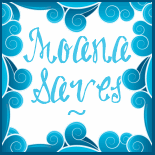As a graduate student in Psychology, I am on the lookout for books that could enhance my skills in the helping profession. And so when I heard about this book "The Way To Stillness" (Anne Alexander Vincent & Gayle Alexander), I was immediately intrigued by the title and jumped on the opportunity to review the book. Although I received the book in April, I postponed writing the review right away because I wanted to do justice to the book.
The authors of the book, Gayle Alexander and Anne Alexander Vincent (mother and daughter) have over 20 years experience working together in leading retreats on spirituality and meditation. And the book speaks of their wealth of experience in practice and of their theoretical and spiritual beliefs concerning helping people.
I found the book to be quite an easy read - a welcome and refreshing change from all the academic books and journals I have to read for grad school.
The authors of the book, Gayle Alexander and Anne Alexander Vincent (mother and daughter) have over 20 years experience working together in leading retreats on spirituality and meditation. And the book speaks of their wealth of experience in practice and of their theoretical and spiritual beliefs concerning helping people.
I found the book to be quite an easy read - a welcome and refreshing change from all the academic books and journals I have to read for grad school.
One label that the authors coined is that of the "Love Motiff". According to the book, the "Love Motiff is offering not only our best and healthiest self to another, but also allowing them the freedom to be who they are without limit or condition" (Vincent & Alexander, X; p 3). I was initially a bit turned-off with the term to be honest, because it reminded me of pop psychology. But if you can get past that initial reaction and try to reflect on the content and apply it in your personal life, then you may be able appreciate the significance of the term.
The label "love motiff" may be new but the essence of the concept is deeply rooted in some of the tenets used in the Christian faith - unconditional love, and of Humanistic framework - the idea of unconditional positive regard and that idea of being "present" with another person/client. The book also illustrates how when used in a therapeutic relationship (or any kind of relationship), the “Love Motiff” could facilitate the process of positive change in an individual. The authors wrote "The Love Motiff levels the ground where we stand and allows us to stand together. For as long as I have been practicing, my heart's prayer has been to be fully present for a client, and to clarify and respond to the deepest needs of that client. That is the absolute bedrock of my practice" (p.97).
The label "love motiff" may be new but the essence of the concept is deeply rooted in some of the tenets used in the Christian faith - unconditional love, and of Humanistic framework - the idea of unconditional positive regard and that idea of being "present" with another person/client. The book also illustrates how when used in a therapeutic relationship (or any kind of relationship), the “Love Motiff” could facilitate the process of positive change in an individual. The authors wrote "The Love Motiff levels the ground where we stand and allows us to stand together. For as long as I have been practicing, my heart's prayer has been to be fully present for a client, and to clarify and respond to the deepest needs of that client. That is the absolute bedrock of my practice" (p.97).
What I like about the book is that it highlights the authors' rich reflections on their life experiences in the helping profession. It is written in an honest and straightforward manner interspersed occasionally with short examples from the authors' experiences working with clients. Although the concepts discussed in the book may be already familiar to those in the helping profession, I think most could relate with the general themes presented in the book - the importance of spirituality in counseling, genuineness, and unconditional acceptance. Also, if you are into pastoral counseling or a practicing Christian, you may be able to appreciate this book much more.
In general, I find that the value and power of this book largely depends on how much the reader's values and beliefs systems are aligned with that of the authors'; and how much they will allow these to take life and meaning in his/her own life. My experience is you need to make the effort to commit to the process of what was being described in the book to fully appreciate it. I may not subscribe wholly and strictly to the authors' worldview but I recognize and respect the moral themes and positive values that the book espouse, including the concepts they used from humanistic psychology and the Christian faith.
Disclosure: Rebecca from the The Cadence Group provided me with a free copy of the book to review but I did not receive any monetary compensation. The review is based on my personal honest opinion and does not reflect the authors' views.











































































































No comments:
Post a Comment